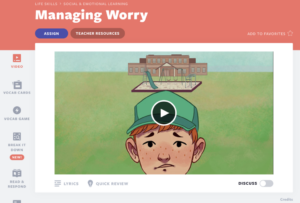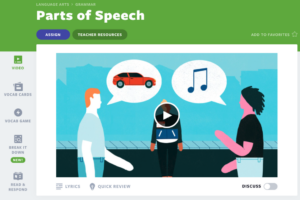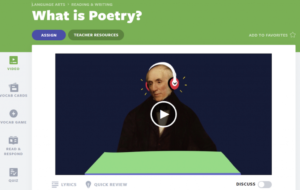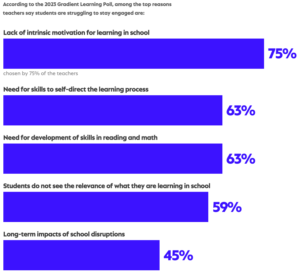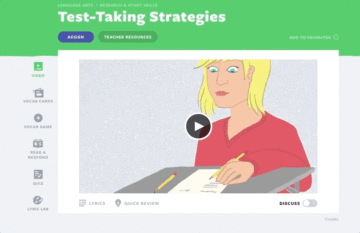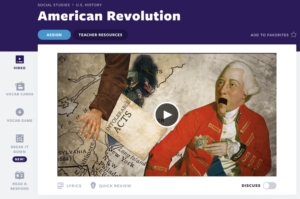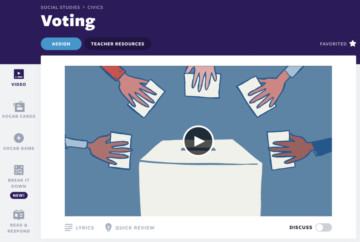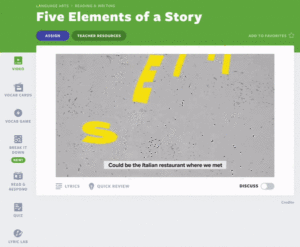As standardized testing season approaches, the classroom can become a whirlwind of testing preparations. Whether you are participating in standardized testing or just wanting to review the curriculum students have learned this year, it’s important for teachers to go beyond curriculum because there’s more to being prepared than just knowing all the answers.
Students must be able to deal with stress and anxiety, have good studying habits, and practice the act of taking a test itself. How do you address these skills in the classroom? We asked teachers this very question, and here’s what we found.
1. Discussion is a key component of learning
We know it takes time for students to retain new material after they learn it. According to teachers, a critical way of developing a deep understanding of new information is by discussing it. There are lots of approaches to class discussions, but here at Flocabulary, we build it into our videos with Discussion Mode, which pauses videos at critical points to help students analyze what they are learning through prompted discussion questions.

By having a conversation about what they’ve learned, students are able to interact and form a deep understanding of new information. You can also turn Discussion Mode questions into writing prompts for even more interaction!

Chance Harding: Instructional Innovation Specialist – Virginia – “I find students can learn the most from the discussion mode. As a class, we can go over the discussions to make sure we are on the same page and it’s important for students to understand their own thinking.”

Brook Sharpnack: 5th Grade ELA and Social Studies Teacher- Pennsylvania – “About a week before our testing, I like to review test-taking strategies with my students. I like the Test-Taking Strategies Flocab lesson because it’s a way to review these strategies in a fun, exciting way. The discussion mode facilitates conversations about do’s and don’t when taking the test.”

2. Music and rhythm help memory
We have all experienced a song and its lyrics that get stuck in your head. Setting new information to a catchy beat or presenting it in lyric form makes it easier for students to remember new vocabulary or concepts and apply that knowledge on a test later.
Whether you’re preparing for a high-stakes test, or just want to review content you’ve covered in the last year, Flocabulary’s hip-hop videos and supporting activities are a great way to review. K-12 standards-aligned videos are available in the four major content areas for language arts, math, science, and social studies.

Jordan Harrill: 7th Grade Social Studies Teacher- California – “I have students watch the video and play the vocabulary game. Students love the engagement of the video and the great beats the vocab game provides. I then have them create their own rap using the Lyric Lab. When it’s time to take the test, students will be reminded of the song they created. It is so awesome to watch kids humming or mouthing the words to their songs to help them during their test!”

Jordan Harrill: 7th Grade Social Studies Teacher- California – “I have students watch the video and play the vocabulary game. Students love the engagement of the video and the great beats the vocab game provides. I then have them create their own rap using the Lyric Lab. When it’s time to take the test, students will be reminded of the song they created. It is so awesome to watch kids humming or mouthing the words to their songs to help them during their test!”
3. It’s not just about the content
Though the purpose of standardized testing is to do a summative assessment of what students know, there are a lot of other factors that can affect how well students perform. When reviewing content or preparing for a standardized test, students should learn about goal setting, time management, dealing with anxiety or nerves, and other SEL topics.
Addressing these skills can do a lot to prepare students for tests and even teach them how to study on their own. Flocabulary’s SEL lessons encourage a positive mindset and set your students up for success.

Jordan Harrill: 7th Grade Social Studies Teacher – California – “While scoring as high as possible on these tests is ideal, we know that it is not the only thing that matters to us as a school and community. It is only part of who they are, and we are much more interested in creating leaders that make their own way and provide their own ladders of success in whatever field they choose. My students were much more self-motivated and excited to take the tests. Since using these lessons, I noticed that the morning of the first day of testing, students were excited, not worried, loose, and more at ease. Those rhymes were flowing through their heads.”

Amanda Scott: 3rd Grade Teacher – South Carolina – “I like the Managing Worry video lesson. Many of my students worry about how they will perform and we talk about calming strategies after watching the video.”

Katy Williams: 4th Grade Teacher – Indiana – “When prepping for high-stakes testing, we usually focus less on actual content (avoiding the whole ‘teaching to the test’ mentality) and more on skills and strategies. I focus on test-taking strategies, ways to calm down and focus, and setting goals. We always joke as a class that there is “a Flocab for everything!” Watching Flocab videos before testing makes it seem so much more routine and approachable. We watch at least 2 Flocab videos per week between our weekly vocab lesson and weekly skills, so seeing Flocab videos connected to testing helps their confidence. They know if there is a Flocab about it, it is a skill they can tackle!”
4. Practice testing in a recognizable format
It’s much easier to prepare for and do well on something that you’ve seen before. When preparing students for standardized testing, many teachers said it was useful to be able to do dry runs of tests using formatting that would be familiar to students, come test day.

Jordan Harrill: 7th Grade Social Studies Teacher – California – “The Quiz is a great tool because you can reassign it if they do not pass, and this is reflective of what they would experience with the real test. I have had students in the past do both the read & respond and quiz. The read & respond activity gives them practice to go over comprehension, vocabulary, and test-taking strategies. Flocabulary has embedded those strategies and skills within the lesson itself! It’s great and the kids love Flocab and are always excited to go for it. When it’s time to take the standardized test, my students are always a little bit more at ease and less nervous. Thanks, Flocab!”

Caitlyn Clayton: 8th Grade ELA Teacher – Illinois – “The questions on the read and respond and the quizzes help students to practice answering questions that are similar in format to the ones they will see on our state tests.”
5. Differentiate your instruction
Test preparation and review are about to get even better with the ability to differentiate for your students within Flocabulary. To give each student the individualized attention they need, you can customize which lessons you assign to which student based on their level of understanding.
The ability to create assignments for specific students rather than just the whole class empowers teachers to provide tailored instruction to all students. This feature is perfect for ensuring that each student in your class is as prepared as they can be for standardized tests.

6. Explore our content for topic review or test preparation
With so many different Flocab lessons to choose from, there are a lot of options for enhancing your test preparation plans or just a simple review with students before taking a unit assessment or even at the end of the year.
If you aren’t doing a standardized test, Flocabulary videos are still a great way to review concepts before a classroom assessment of any kind. Hip-hop videos and their supplemental activities make review not only a fun activity but something that can bring a deeper understanding to a concept.
All video topics have Read and Respond passages and Vocab Cards available. These provide students another way to practice test-taking skills in environments that mimic standardized tests. These activities are also printable under teacher resources for each video topic, so you can even take learning offline. Print them out or assign them as homework online.

Katy Williams: 4th Grade Teacher – Indiana – “We will watch and discuss other big topic videos before tests, like theme, main idea, text structures, etc. This year we may also use the 5 Paragraph Essay video before testing because of the big focus on writing in our state test. We also use Flocab videos as a testing break or celebration time after testing is completed for the day. I will usually play some of their favorites so they can get up and sing/dance after a long testing session!”
The standardized testing season can be a stressful time for students and teachers alike. By following these six tips, you can do a review or go into test preparations feeling confident in both your ability to prepare students for standardized tests and their ability to ace those tests.
- activities
- Anxiety
- Bit
- build
- community
- component
- confidence
- content
- Conversation
- conversations
- Creating
- day
- deal
- dealing
- etc
- Feature
- First
- Focus
- form
- format
- fun
- game
- gif
- good
- great
- head
- here
- High
- homework
- How
- How To
- HTTPS
- Indiana
- information
- Innovation
- IT
- Key
- kids
- knowledge
- LEARN
- learned
- learning
- Level
- Long
- love
- major
- management
- Matters
- Music
- online
- Options
- Other
- Quiz
- Resources
- review
- School
- set
- setting
- Simple
- SIX
- skills
- So
- Social
- South
- State
- stress
- Student
- studies
- Study
- success
- teacher
- teachers
- test
- Testing
- tests
- Thinking
- time
- tips
- Topics
- us
- Video
- Videos
- Watch
- week
- weekly
- WHO
- within
- words
- writing
- year



